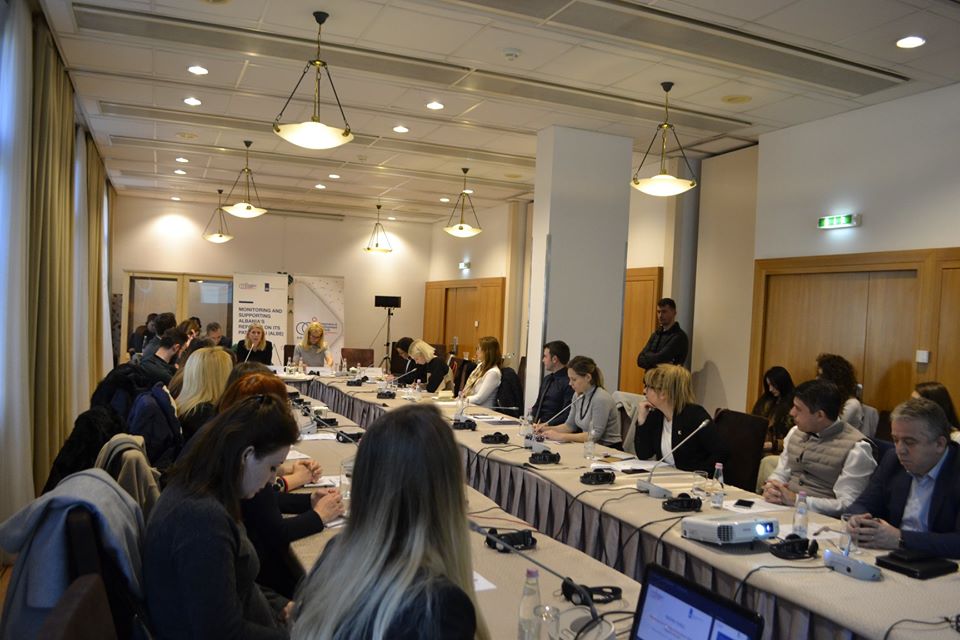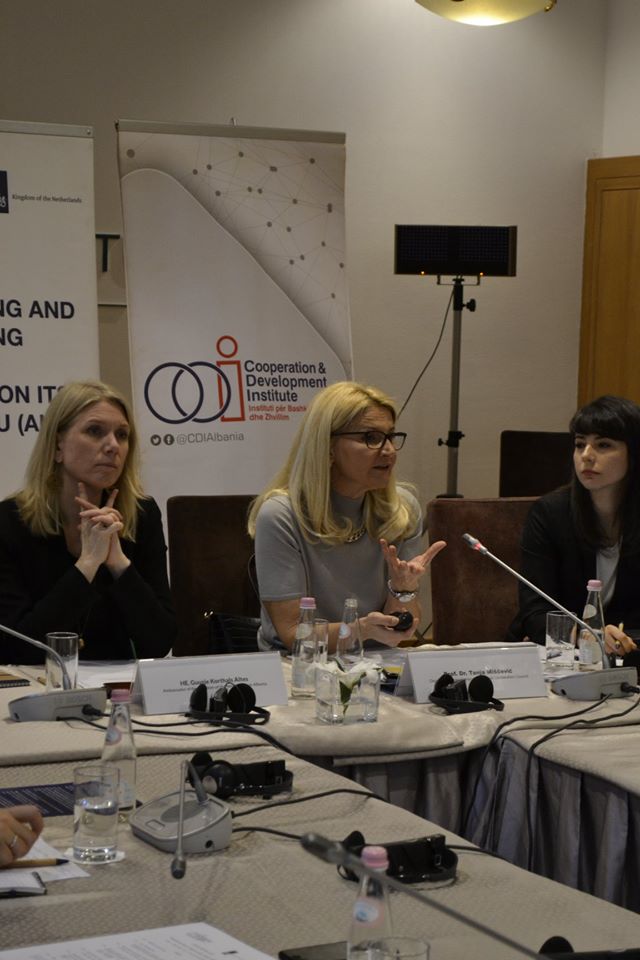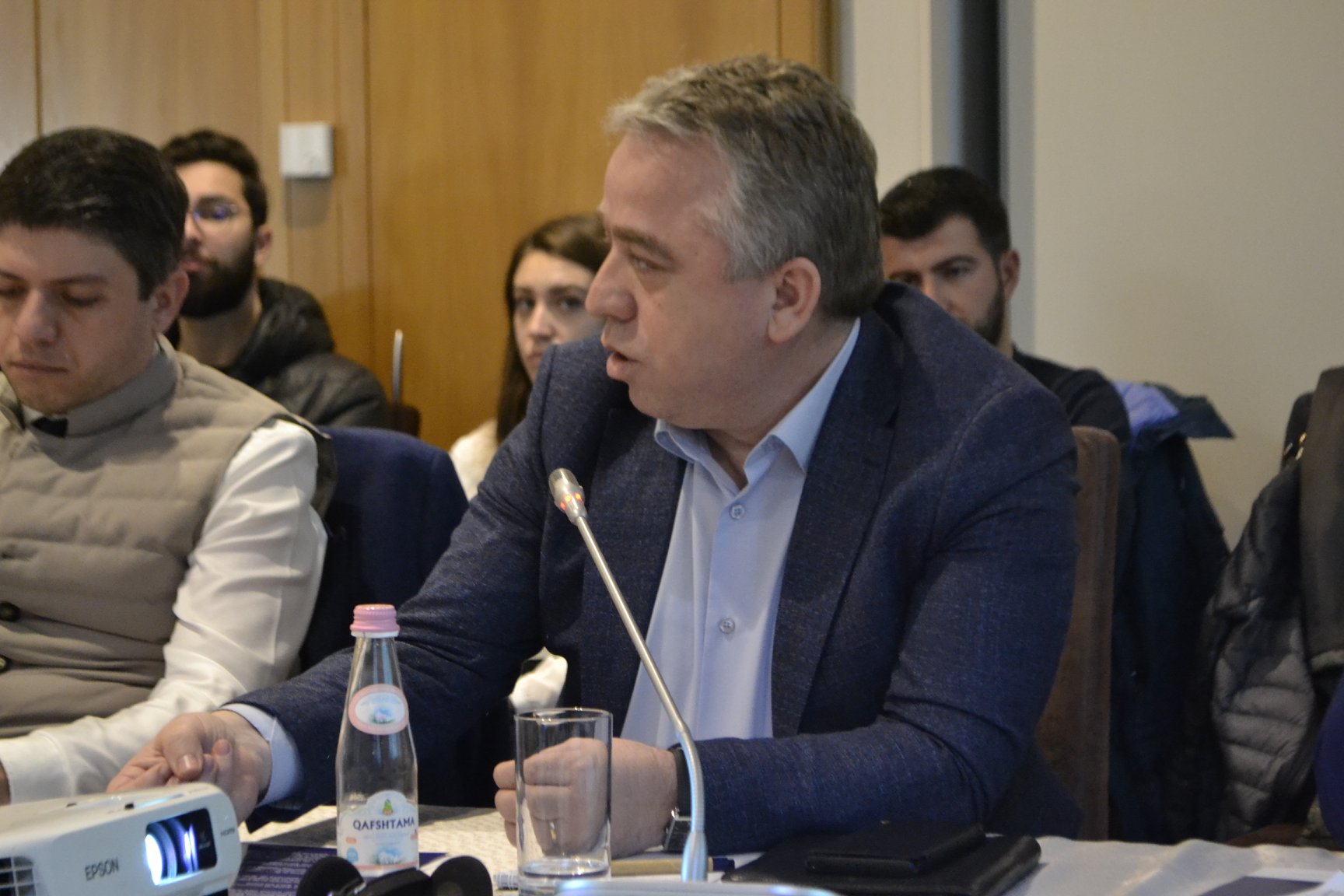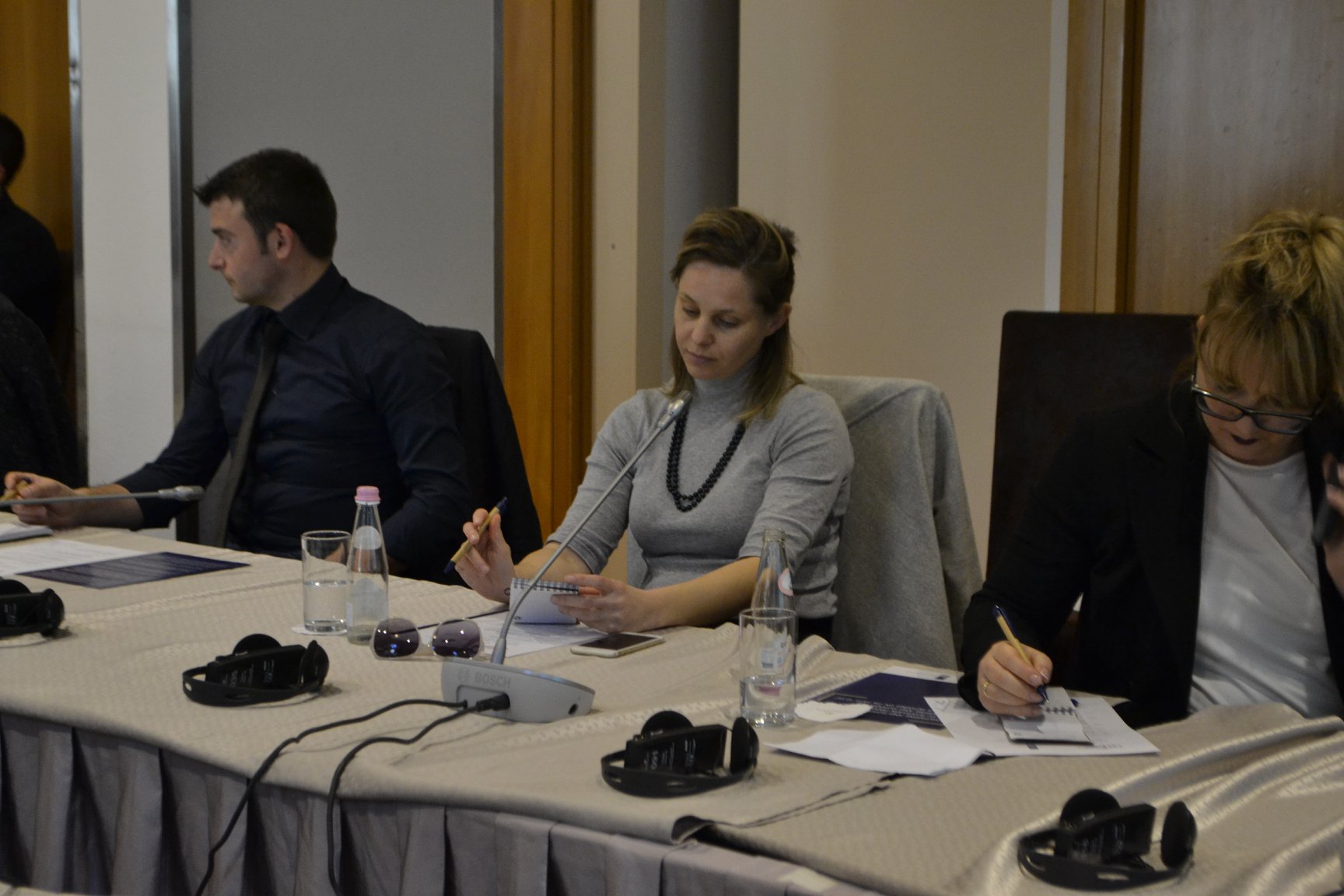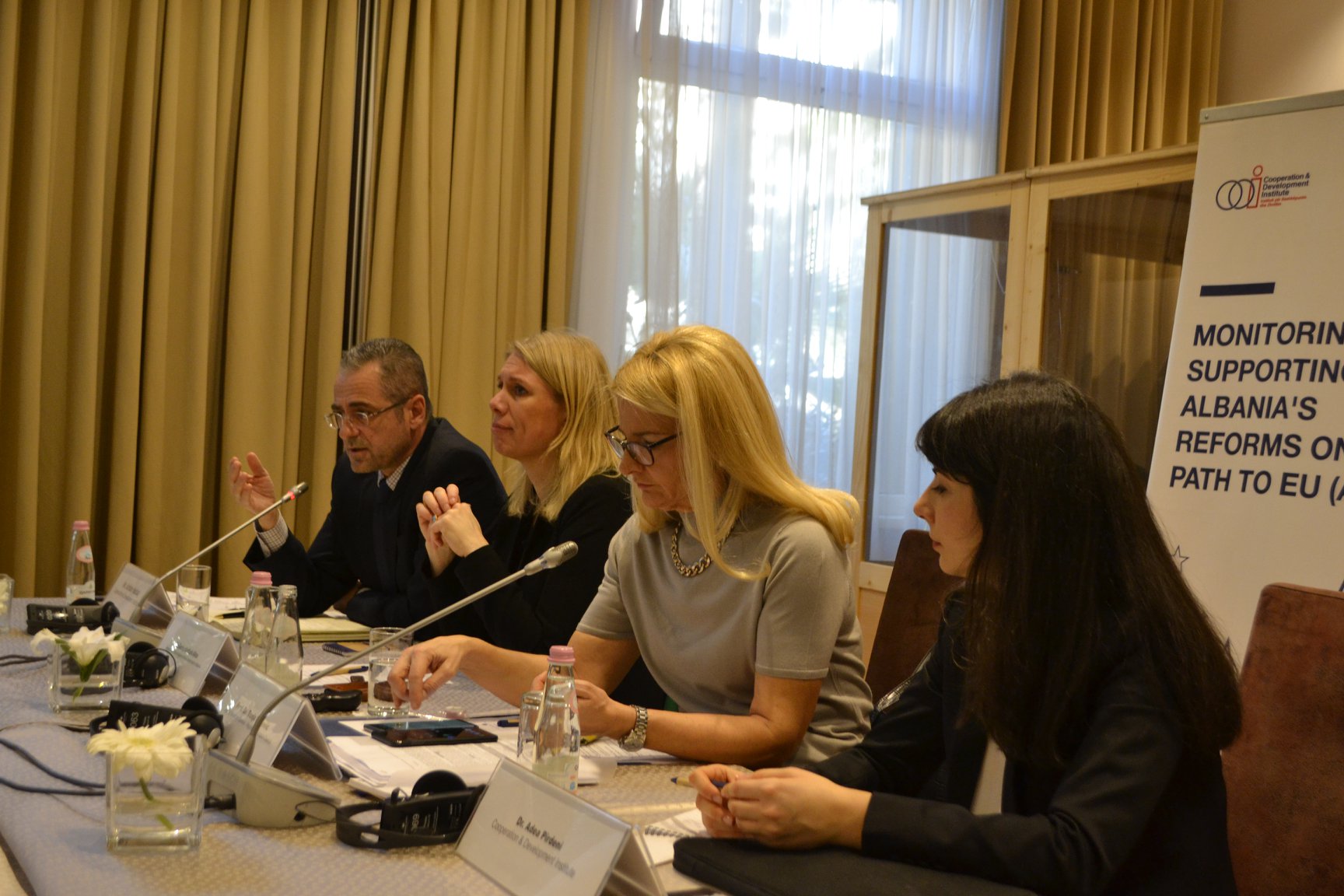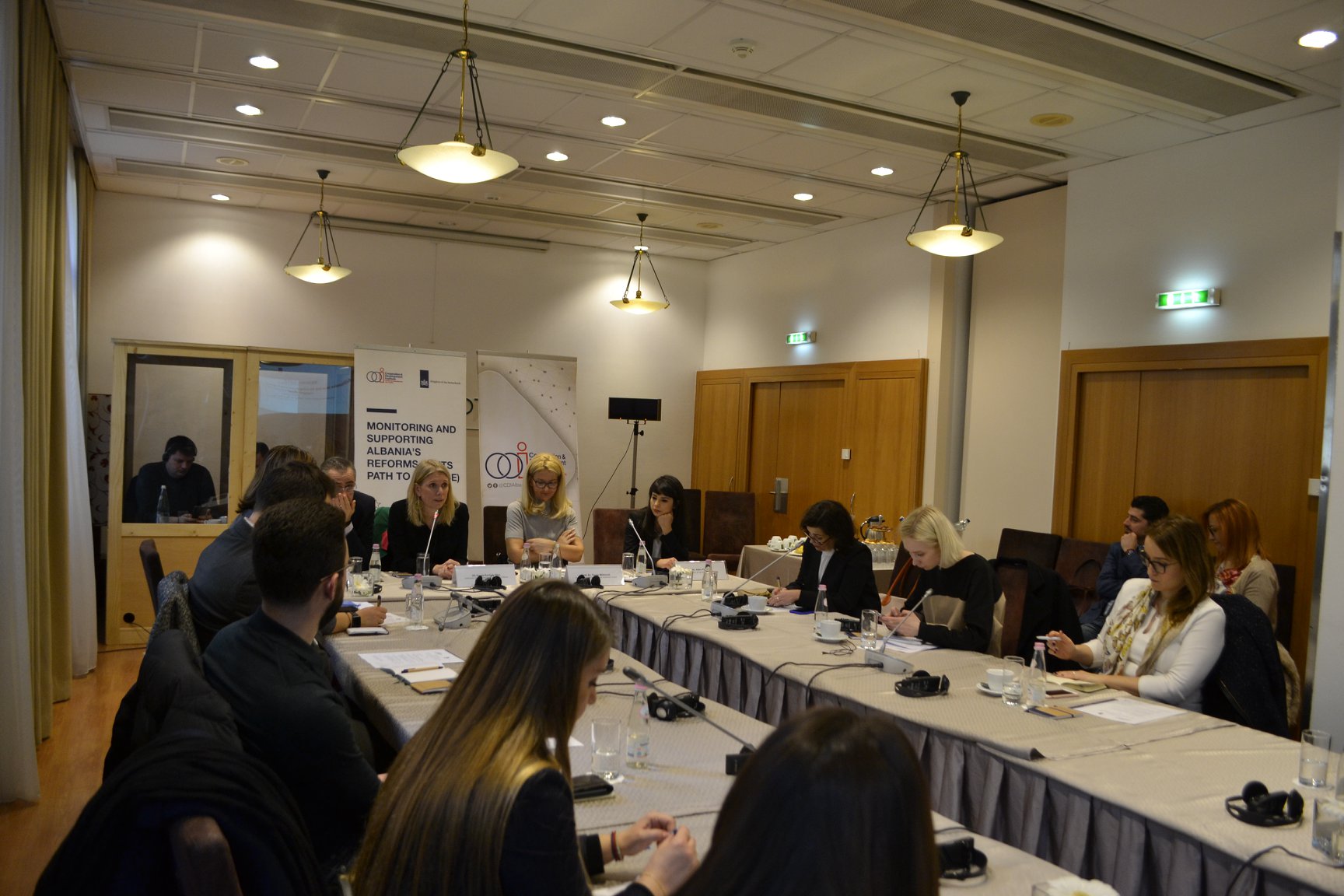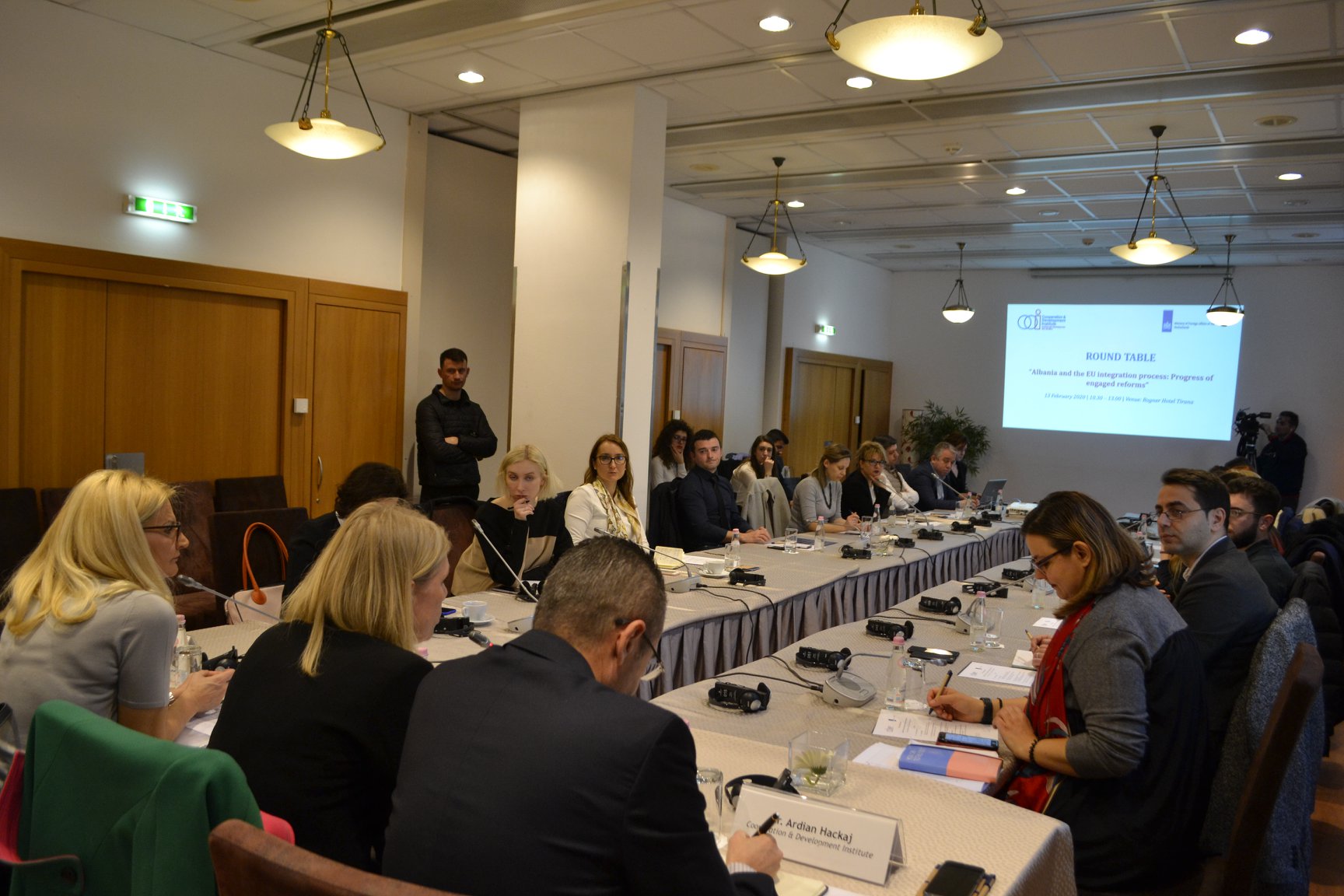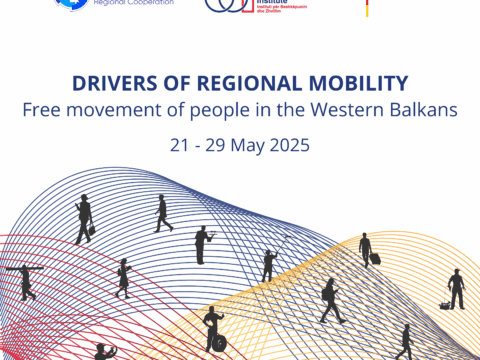The roundtable “Albania and the EU integration process: Progress of engaged reforms” was focused on the inter-relations between the New Enlargement Methodology and the ongoing Reforms in Albania. The participants discussed the achievements and challenges in the context of Justice Reform, the dynamics of the negotiation process in Chapter 23, and presented an innovative methodology that can be used in defining the roadmap for the Functioning of Institutions. Participants were experts in the Rule of Law, public officials from Government, academics, students, media representatives, Civil Society Organisations etc.
IN her welcome address, HE. Guusje Korthals Altes, Ambassador of the Kingdom of the Netherlands in Albania underlined the huge support within EU for Albania on its reform process in its way to EU. “EU is very dear for US” – she said, “that’s why we are protective of EU, so that it will be there for generations to come. This is where our engagement comes from”.
Regarding to the New Enlargement methodology, she emphasized the push on the Rule of Law, which is crucial and determines the speed of the integration. A lot of development has been noticed in the region, especially for Albania. But this must not be considered just a check in the box from the government. Further development must strengthen democratic institutions and strongthen the trust of the citizens.
Mr. Ardian Hackaj from CDI, followed by commenting shortly on the New Enlargement methodology, underlining the importance of trust and conditionality, and the inclusion of the institutional reforms in the cluster of Fundamentals. This new approach makes ALBE initiative very relevant. “We have been working since last year to identify and provide the elements for a roadmap and the benchmarks for implementation and monitoring of functioning of new justice reform institutions”, he said.
Prof. Dr. Tanja Miščević, Former Chief Negotiator of the Republic of Serbia, and Deputy Secretary General of Regional Cooperation Council, provided her insights about the recently published Enlargement methodology. The NEM has enlarged the scope of fundamentals. The methodology was always a political one, despite the fact that enlargement is managed by the EU Commission. The new Enlargement methodology needs to be endorsed by all the MS. National preferences of MS are very important. Moreover MS have to find consensus, even if some of them do not have former experience with the RoL reforms in their own countries. There is no EU law, practice, existing standards, lessons learned on Functioning of Democratic Institutions, she said, and there are many national models. The introduction of a Roadmap for Functioning of Democratic Institutions and Public Administration Reforms aims at saving time given that the Action Plan approval can take up to 3 years. Shadow reports from Civil Society can be used for the Fundamentals roadmap, while the focus should be on inclusiveness. Also the enabling the candidate countries to observe closer the decision-making processes in the EU constitutes an excellent development. Prof. Miscevic finished her presentation by underlining the importance of political will, the need for higher IPA3 amounts allocated to WB6, and on the need to clarify some criteria and benchmarks.
Prof. Afrim Krasniqi brought his expertise in the discussion of eventual components of the Roadmap on Functioning of Democratic Institutions by focussing on the financing of political parties.
Dr. Gentian Elezi, concentrated his intervention into the question of credibility of the negotiating process under two issues: i) lack of coordination among experts of MS and EC; and, 2) the disparity between findings and conclusions in the Country Reports. “This undermines the credibility of the process”- he mentioned.
Ms. Elga Mitre from Embassy of Netherlands raised the issue of participation mechanism and the role that civil society should have in the new methodology.
HE. Guusje Korthals Altes stressed out that reports are all about factual findings. Member states follow with their own monitoring as well. Whether conclusions maybe political, the achievements and challenges that each country faces, must be evidenced properly.
Dr. Adea Pirdeni, Senior expert of Cooperation and Development Institute, presented the research methodology’s rationale and the preliminary findings from the Justice Reform. The New Enlargement Methodology Re-instated the importance of fundamentals-based on reforms. The frontloading rule of law conditionality puts the focus on the progress in the areas covered by Chapters 23 and 24. She continued by stating that the multi-layered governance of the enlargement process means less strategic role of the Commission and member states acquiring an active role in monitoring reforms. Currently EU Commission is engaged in in both; i) “input legitimacy”: A sound legal and strategic framework is in place, and ii) “output legitimacy”: Does the system deliver and / or do the Albanian institutions produce satisfactory outcomes? However this pre-negotiation (or frontloading of conditionality) covers the input (or legitimacy of newly established structures) and the output (their efficacy). ALBE is assessing: “Throughput legitimacy”: the capacity of institutions to function efficiently and produce qualitative and efficient outputs without external assistance, namely the functioning of the institutions.
Chapter 23 is identified as the crucial intersection point between the engaged reforms and EU- integration, with a special emphasis on the reform on the judiciary. The underlying rationale of ALBE is to inquire beyond the acquis (adoption of legislative framework), and dive in the good governance mechanisms of newly established structures that condition their impact and sustainability Some of the preliminary conclusions are:
- Albania is a frontrunner in Justice Reform
- significant delays in the process of establishing the new justice governance institutions and the appointments in the highest courts of the land;
- dismissals deriving from the vetting process have affected the proper functioning of all instances of the judiciary and prosecution, by putting at risk the respect for the right of citizens to a fair trial;
- small pool of qualified candidates available to be appointed within the judiciary, prosecution and related governance institution,
- unforeseen issues arising and the lack of mitigation scenarios that could have prevented institutional deadlocks;
- existence of political tensions in the process of adopting relevant legislation and in the appointment of CC judges;
- relatively high level of transparency from the newly established institutions.
On top of more ongoing vetting process, the Justice Reform in Albania has resulted until now in the creation ex-nihilo of a myriad of new structures or institutions, and the radical restructuring of another four existing ones. This is an extremely heavy and costly process that aims to transform the governance system in the country.
The Justice Reforms design shortcoming were translated in: i) problems in the institutional functioning of newly established structures; ii) contradiction amongst long term perspective needed for the reforms to produce significant outcomes and impact, with the short term obligation of results put by the EU institutions and MS.
With the NEM, Albania needs to adapt the Justice reform monitoring methodology so as to accommodate the increased role of MS in the new methodology. On the other side, EU institutions and member states must acknowledge the complexity of the reform, its long-term perspective, and very high cost. To continue successfully in its tracks, Albania needs to undertake appropriate measures to staff the newly established institutions (HJI, SPCOC), and allocate the necessary budget.
The report is expected to be published by the end of March.
This event was in the framework of the initiative “Preparing and Supporting Albania in the EU Accession Process” supported by the Netherlands Embassy in Tirana. The agenda of the event can be consulted here.



